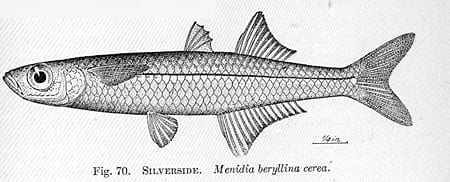By Daniel de la Calle
A new year has begun and that fabricated clean slate feeling is very encouraging. Please find below the almost classic by now mix of news, job offers and information. Same style, new content:
•Fish larvae might be directly harmed by Ocean Acidification: various news published on December 11th, 2011, in the journal Nature Climate Change by an international research group led by the Leibniz Institute of Marine Sciences and by professors at Stony Brook University School of Marine and Atmospheric Science claim to have found evidence for harmful effects of acidification on the larvae of commercially important fish species. “Test series showed that the larval stages of cod is especially vulnerable to changes in the pH-value,” explains Andrea Frommel. Frommel and her colleagues from Germany, Norway and Great Britain exposed Atlantic cod offspring to three different carbon dioxide concentrations: today’s concentration (380 ppm), the expected concentration for the end of the next century (1800 ppm) and an extreme concentration that may be reached in coastal areas in the future (4200 ppm) to examine the influence of ocean acidification.
Andrea Frommel said: “fish were considered to be relatively robust to changes in pH because of the fact that they are good acid base regulators, but our research found damage to cod larvae raised at 1800 ppm which is already found in several places today.”
The SoMAS scientists reared newly fertilized eggs of inland silverside (Menidia beryllina), a common estuarine fish, under different CO2 levels (current: 400 ppm, mid-century: 600 ppm, end-of-century: 1,000 ppm) and found that egg and larval stages of these fish were highly sensitive to CO2.

Image from the Freshwater and Marine Image Bank
On average, survival rates until one week post-hatch declined by over 70% under elevated (1,000 ppm) CO2 conditions. Surviving larvae were also 18% smaller in the high than in the low CO2 group. The experiment was fully replicated and repeated five separate times, each revealing the same pattern.
Please read more HERE, HERE and HERE.
•We have all seen it, have all done it: some information gets published online or a newspaper and we all contribute to spread its content with the lightness of dandelion seeds, but quoting it as if written in stone. When Matt Ridley wrote last week his article “Taking Fears of Acid Oceans With a Grain of Salt” it was immediately picked up as evidence and ammunition for the political war all-matters-environmental have become, it was cited and copied on blogs and sites, same as I do right here. So why mention this uninspired article, why pick and peck on this one and not any other? First, because it was written in the Wall Street Journal and I have to admit I was completely shocked that even someone like myself, with no scientific background, could refute all of Mr. Ridley’s statements in the blink of an eye. After reading about the author I discovered he recently wrote a book titled The Rational Optimist, so Mr. Ridley makes a living with words, showing at times the sunny side of things. The problem is that everyone behaves, thinks and talks at points in life in an irrational fashion and optimists lacking reason and logic or moderation run the dangerous risk of looking either malicious or not as brilliant as advisable when it is millions that read their words. The link to the article is up there, so I will say no more on that. The true reason why I brought it up in the first place was because it serves as the perfect backdrop to direct you to another page that deals with agnotology, “the deliberate and skillful cultivation and dissemination of notknowing – doubt – for the specific purpose of manufacturing confusion”.
I cannot resist it, allow me to just quote one of the paragraphs before letting you click on that link:
“So, how is the lay public to know the difference between real science and pseudo-science? This is the obvious problem created by agnotology and cultivated by those who want to propagate doubt. Some hints are obvious. First, pseudoscience tends to be contrarian, arguing against a momentum of scientific evidence reached by peer-reviewed research and careful empiricism. Second, those who have economic interests usually take a position that favors their profits – so follow the money. Three, use one of Einstein’s “thought experiments” to imaginatively extend the claim to its logical extreme – if the extremity is absurd then the claim is questionable. And four, consider ideologies. Pseudo-science usually supports a belief system. Real science is evidence-based and follows where the data leads, regardless of threats to paradigms of thought or to individual and corporate interests.”
Let’s not just take Ocean Acidification but life in general with that recommended grain of salt thanks to this hilarious video about another happy-go-lucky fellow with little knowledge.
“Say no more, say no more“:
•Good PhD opportunity at James Cook University and the Australian Institute of Marine Sciences: Will ocean acidification increase seagrass productivity in conditions of declining water quality?
If interested read HERE
•There is a PhD Position in Biogeochemistry at the Leibniz Center for Tropical Marine Ecology in Bremen as well. They are “seeking an excellent PhD candidate with a background in biology, ecology, chemistry, biogeochemistry, or geology. The ideal candidate would have experiences with marine photosynthesizing and calcifying organisms.”
More info HERE
•Finally, you can also apply for a Postdoctoral Research Fellowship in Carbonate Chemistry at the University of Southampton, UK. The School of Ocean and Earth Science, National Oceanography Centre Southampton, University of Southampton is seeking to recruit a Carbonate Chemistry Postdoctoral Research Fellow to manage the operations and maintenance of the NERC Funded UK Ocean Acidification Programme Carbonate Chemistry Facility.
Find out more HERE
•The Leibniz Prize for 2012 goes to honor 11 researchers. One of them does work on Ocean Acidification: Prof. Dr. Ulf Riebesell, from the Leibniz Institute of Marine Sciences at University of Kiel, “was one of the first researchers to examine the influence of acidification and ocean warming on marine organisms and ecosystems. He focused especially on plankton and other calcareous and calcifying organisms in the ocean. In his experimental work — initially in the laboratory and later with free-drifting mesocosms in the Baltic Sea, Norwegian fjords and the Arctic — Riebesell was able to show how increased uptake of carbon dioxide from the atmosphere reduces the pH value in oceans and the ability of calcareous organisms to produce shells.”
The Leibniz Prize of the German Research Foundation is awarded since 1986 to outstanding scientists for their research in all different scientific fields. It is endowed with 2.5 Million dollars that can be used by the winners suiting their requirements within a time span of seven years.
Read more about Prof. Riebesell and the other 8 men and 2 women being awarded HERE and HERE.
 Agnotology
Agnotology


